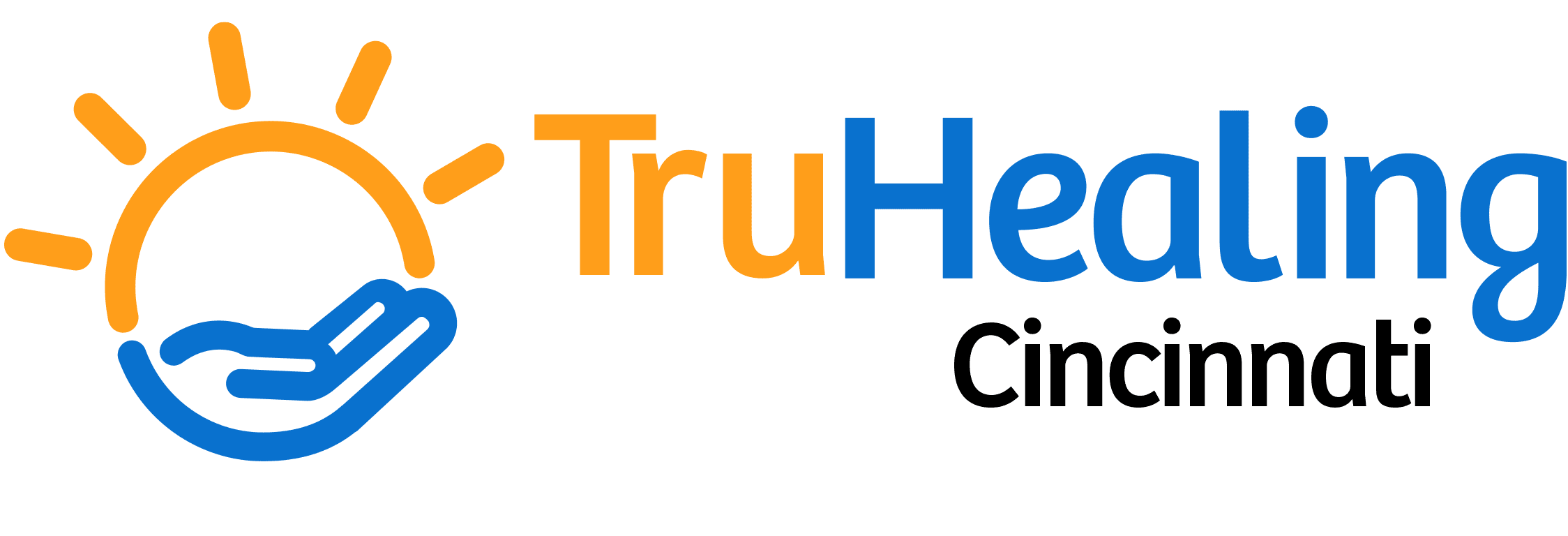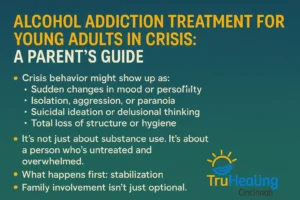It’s happening, and it’s terrifying.
Your child’s behavior has changed. The drinking isn’t just “college stuff” anymore. Maybe it’s paired with mental health issues, maybe it’s progressed quickly, or maybe it’s been quietly building for years. But now it’s no longer quiet—and you don’t feel safe waiting.
When a young adult is in crisis, every decision feels urgent and impossible at the same time. You’re afraid to act. You’re more afraid not to. And in the middle of it all, you’re still the parent—expected to fix things, hold space, make the right call.
Alcohol addiction treatment can feel like a lifeline. It can also feel completely overwhelming. What does it actually involve? What if your child refuses to go? What happens to your family while they’re gone?
At TruHealing Cincinnati, we help parents and families navigate this exact moment—with clear information, real emotional support, and treatment options designed for young adults in distress.
When Alcohol Use Signals a Behavioral Health Crisis
It’s not just the drinking. It’s what the drinking is covering up—or what it’s making worse.
Crisis behavior might show up as:
- Sudden changes in mood or personality
- Isolation, aggression, or paranoia
- Dangerous risk-taking or impulsivity
- Suicidal ideation or self-harm
- Disconnection from reality or delusional thinking
- Total loss of structure or hygiene
Sometimes alcohol is used to quiet the chaos. Sometimes it fuels it. Either way, it’s not just about the substance. It’s about a person who’s overwhelmed, untreated, and at risk.
Parents often say:
“I didn’t know what was substance use and what was mental health. I just knew we were losing him.”
That’s why comprehensive treatment matters—because your child needs help sorting out what’s happening inside, not just being told to stop drinking.
What Happens First: The Treatment Entry Point
No matter how complex your child’s situation is, we start with one thing: stabilization.
This early phase may involve:
- Medical detox (if physically necessary)
- Mental health assessment for co-occurring conditions
- Immediate safety planning if your child is a danger to themselves or others
- Family consultation to orient you and help you prepare
This is the moment when parents can start to exhale—just a little. Because your child is being held by professionals who know how to respond, de-escalate, and support.
The Core Components of Alcohol Addiction Treatment
Once stabilized, the real work of treatment begins. At TruHealing Cincinnati, our approach to alcohol addiction treatment includes:
1. Individual Therapy
A safe, consistent space for your child to process shame, trauma, stress, and self-identity. Therapy is adapted to developmental needs and any co-occurring diagnoses.
2. Group Therapy
Peers become mirrors and motivators. Your child learns to give and receive support, reflect on their patterns, and reconnect with others in healthy ways.
3. Family Support
You’re not just included. You’re considered part of the healing process. This includes optional family therapy, regular updates (with consent), and educational resources.
4. Skill Building
Many young adults in crisis missed out on learning basic emotional regulation, communication, or even daily living skills. We integrate these into care plans.
5. Aftercare Planning
From day one, we’re thinking about what comes next—outpatient care, sober living, therapy continuation, and support for re-entering school or work.
Why Family Involvement Isn’t Just Optional
Families are often traumatized too. You may be carrying years of emotional whiplash—hope, betrayal, grief, fear, love, exhaustion. You may also be second-guessing everything:
“Was I too hard?”
“Too soft?”
“Should I have seen this sooner?”
The truth is, none of that disqualifies you from being part of recovery. If anything, it makes you more essential.
Our family support model helps with:
- Rebuilding trust after conflict or distance
- Setting boundaries that are clear but loving
- Understanding the science of addiction and mental health
- Healing from parent guilt and fear
You don’t need to do everything right. You just need to stay in the room—with support of your own.
Mental Health + Alcohol: What Dual Diagnosis Means
Most young adults in crisis aren’t just dealing with alcohol misuse. Many are also navigating:
- Generalized anxiety disorder
- Depression or bipolar disorder
- PTSD or complex trauma
- Personality disorders or early signs of psychosis
- ADHD or neurodivergence
- Disordered eating, self-harm, or OCD
When these issues go undiagnosed, alcohol becomes a form of survival. But over time, it makes everything worse.
That’s why dual diagnosis care—treating both the substance use and the mental health issues—isn’t optional. It’s essential.
At TruHealing, every client is assessed by a multidisciplinary team that builds a plan around their specific needs, symptoms, and readiness.
“But What If My Child Doesn’t Want to Go?”
This question stops so many parents from reaching out. The fear of refusal, resistance, or even outright rebellion is real—especially if your child is legally an adult.
But here’s the truth:
You can still act, even when they’re not “on board.”
We work with families to:
- Create intervention or invitation strategies that are trauma-informed
- Identify if mental health crisis or safety risk warrants a higher level of intervention
- Support your boundaries so you’re not enabling ongoing harm
- Offer admissions guidance even if your child isn’t “ready”
You don’t have to wait for them to hit a mythical rock bottom. Often, a structured treatment environment becomes the moment clarity begins.
Frequently Asked Questions (Parents in Crisis Edition)
How do I know if it’s time for treatment?
If your child’s drinking is causing safety concerns, emotional instability, or daily dysfunction—and talking to them hasn’t helped—it’s time. Especially if alcohol is combined with mental health concerns.
What if they deny they have a problem?
Denial is common. We recommend focusing on behavior, not labels. You don’t have to convince them they’re an addict. You just need to say, “This isn’t working anymore, and I love you enough to help us all get support.”
Can I force them into treatment?
If they are over 18, involuntary treatment is rare unless there’s a legal or medical danger. But you can change the dynamic: set boundaries, withdraw enabling support, or stage a guided intervention with professional help.
What if I’m afraid for their safety?
Call us. We’ll walk you through how to assess immediate danger and what local emergency steps may be appropriate. If your child is actively suicidal or psychotic, emergency mental health intervention may be the safest first step.
What support is available for parents?
We offer family therapy, education sessions, and local referrals. We also encourage you to find a therapist for yourself. You’re in crisis too—and you deserve space to be human in this.
How long does treatment take?
Every case is different. Some young adults begin in residential or intensive outpatient care and transition to ongoing outpatient therapy. What matters most is not speed—but sustainability.
You’re Not Alone in This
Call (888) 643-9118 or visit our Alcohol Addiction Treatment in Cincinnati, Ohio to learn more about how we support families and young adults through crisis and recovery. You don’t need to have all the answers. Just one next step. From Lawrenceburg to Lexington, Springfield to Louisville, TruHealing is proud to offer programs that carry forward that same supportive approach.


